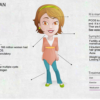Polycystic ovary syndrome (PCOS)
is one of the most common reasons a woman has trouble conceiving in this day and age. This complex condition is characterized by reduced fertility, polycystic ovaries, insulin resistance, obesity, irregular menses and raised levels of androgens.
However, unlike the above clinical symptoms already mentioned, many women with this syndrome also have elevated levels of testosterone, androstenedione, estrone, prenatal exposure of female fetuses to androgen, overweight and obesity, chronic inflammation and insulin resistance.

Anovulatory Cycles: An Anovulatory Cycle occurs when a woman skips ovulation. It’s normal for women to experience an anovulatory cycle at some point in their lives, but if this starts to occur on a regular basis, it is an indication of a much deeper problem; that is a hormone imbalance and possibly fertility issues. Some common, regulated causes of anovulatory cycles are due to excessive weight gain or loss, breastfeeding, coming off the pill, PCOS, stress, thyroid dysfunction and pituitary disorders.
Ovarian Cysts: A fluid-filled sac sometimes develops on one of the ovaries, this is known as an Ovarian Cyst. Most small ovarian cysts naturally go away on their own without treatment but, it’s the bigger cysts that can be painful and cause many problems like development of scar tissue, displacement of reproductive organs and harm the ovaries. The common reasons behind ovarian cysts are usually due to elevated levels of progesterone or estrogen, abnormal follicle growth and development during ovulation, PCOS and Chocolate Cyst (Endometrioma).
Recurrent Miscarriage: Most common causes of a miscarriage are chromosomal abnormalities but, a recurrent pregnancy loss has been linked to hormone imbalances. The common causes are thyroid disorders, luteal phase defect (low progesterone), diabetes, adrenal problems or elevated prolactin that interferes with uterine lining development.
Amenorrhea: Amenorrhea is the absence of menstruation upto 3 to 6 months during your fertile years. The reasons for this include excess or lack of estrogen, being underweight or having a BMI above 30, stress, PCOS, thyroid or pituitary disorders, primary ovarian insufficiency/premature ovarian failure and perimenopause or menopause.
Weight gain: Abnormal and difficult to get rid of weight gain around the midsection, hips, thighs and buttocks are an indication that your hormones are out of balance. The usual suspects include estrogen dominance which causes unnecessary fat gain around the hips, thighs and buttocks and weight gain around the belly maybe be due to high cortisol levels.
Unfortunately, hormonal imbalances are often treated with anti-contraceptive pills or other synthetic hormones but, such drugs can cause serious damage like fluctuations in hormones, increased risk of ovarian cancer and affect fertility. This does not solve the underlying problem which is actually due to toxins, poor diet and an unbalanced lifestyle. Also, exposure to placenta-containing personal care products can affect hormone levels.
What can you do to support healthy hormone balance?
- Accumulation of body fat is mainly due to excess hormones hence it is important to maintain a healthy BMI.
- Try to avoid sudden and extreme weight loss as it affects hormone production and could fertility
- When it comes to animal products try to go the organic way as much as possible. This also reduces your exposure to estrogen mimicking compounds.
- Include in your diet more food that help balance estrogen like high fiber foods, legumes and cruciferous vegetables (broccoli, cabbage, cauliflower, etc)
- Consider PCOS2Pregnancy plan to re-establish healthy hormone balance and encourage natural fertility.
With the knowledge, research and wide exposure, I, Dr. Tehsin Malik have developed a natural plan that can help you fight and heal PCOS and increase your chances of conception. We call it the Pcos2pregnancy plan. Over time, I’ve tested and refined my approach. And I’m proud to say that since then, many of my patients have overcome PCOS naturally and started families, Alhumdulillah.
If your need more information on how to start PCOS2Pregnancy plan -} CLICK HERE






Ma’am im interested I’m trying to get pregnant for 5 years but still not worth it… I hope you are the one my prayer to help me
Dear Sister, Thankyou for your query. If you are still looking for help regarding your health condition, please email dr Tehsin Malik on pcos2pregnancy@gmail.com